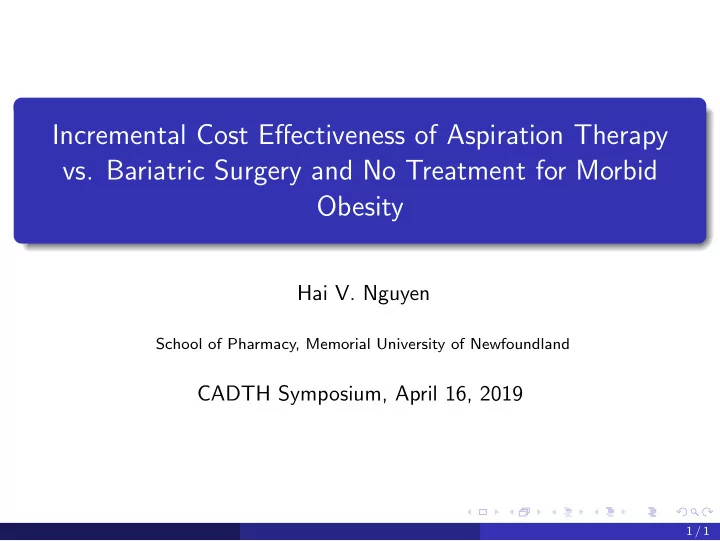

Incremental Cost Effectiveness of Aspiration Therapy vs. Bariatric Surgery and No Treatment for Morbid Obesity Hai V. Nguyen School of Pharmacy, Memorial University of Newfoundland CADTH Symposium, April 16, 2019 1 / 1
Obesity and its treatments Obesity Epidemic 1 in 4 Canadians obese, over 1.5 million morbidly obese (BMI > 35) Healthcare cost of obesity $4.6 - $7.1 billion a year Treatments for morbid obesity: Diet & Exercise (Weight Watchers, Jenny Craig) Pharmacotherapy (Orlistat, Liraglutide, Lorcaserin) Bariatric surgery (Gastric Bypass, Sleeve Gastrectomy) 2 / 1
Bariatric Surgery: Access & Wait times in Canada Only 1 in 183 eligible patients get surgery in a given year Wait times longest of any surgically treatable condition 3 / 1
Aspiration Therapy and Bariatric Surgery: A Comparison Aspiration therapy approved by FDA in 2016 & Health Canada in 2017 Two parts (Internal tube + External device) Patient aspirates 20-30 min after meal Caloric absorption ↓ by up to 30% 4 / 1
Aspiration Therapy Highly Controversial Debate only focuses on clinical aspects, no evidence on cost-effectiveness 5 / 1
Research Questions Is aspiration therapy cost-effective vs. bariatric surgery? Is aspiration therapy cost-effective vs. no treatment? 6 / 1
Advantages & Limitations of Aspiration Therapy (+) Outpatient procedure - low initial cost - faster recovery, complications less severe (-) High maintenance costs (-) Lower weight loss effects than bariatric surgery (-) High discontinuation rates – 47% in 4 years (Nystrom et al. 2018) 7 / 1
The Markov Model Hypothetical cohort 22-74 years , BMI: 35-55 4 strategies: Aspiration Therapy, Gastric Bypass, Sleeve Gastrectomy, No Treatment Health System Perspective, Lifetime horizon 5 Health States 8 / 1
The Model Explained 9 / 1
Model Inputs: Weight loss & Discontinuation 10 / 1
Model Inputs: Costs 11 / 1
Model Inputs: Utilities 12 / 1
Results 13 / 1
Sensitivity Analyses Vary parameter values Efficacy, maintenance costs, discontinuation rates for aspiration therapy 10-year time horizon instead of lifetime Use alternative data for bariatric surgery Long-term (8-10) year weight loss effects data Complication risks from another recent, high-quality RCT and two meta-analyses Probabilistic sensitivity analyses Base case findings continue to hold Aspiration therapy cost-effective if no discontinuation & efficacy ↑ by 35% 14 / 1
Summary & Discussion Aspiration therapy dominated by bariatric surgery but cost-effective vs. no treatment Higher cost ⇔ higher maintenance costs Lower effectiveness ⇔ lower weight loss effects + discontinuation Yet, aspiration therapy can be of interest to: Patients : willing to pay more for lower weight loss but shorter wait time Policymakers: keen to reduce wait times for bariatric surgery Limitations: Non-RCT, short-term weight loss effects of aspiration therapy Utility from food consumption not captured 15 / 1
THANK YOU! 16 / 1
Recommend
More recommend